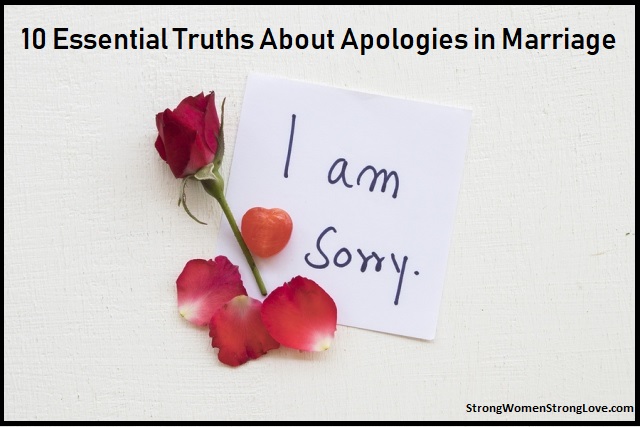In my last post, I talked about the importance of repair in your relationship. All couples go through conflicts, misunderstandings, and hurt feelings, and it’s very important to resolve them.
One of the tools you need in your relationship repair kit is the ability to give and accept an apology. Apologies are so important that renowned psychologist and relationship expert Harriet Lerner devoted an entire book to the subject: Why Won’t You Apologize? Healing Big Betrayals and Everyday Hurts. This book is required reading for strengthening your marriage, not to mention all the other relationships in your life.
Adapted from Lerner’s work, here are 10 essential things you should know about apologies:
- Apologizing well requires listening deeply to the person you hurt. Your apology should begin by fully understanding their feelings and experience, no matter how difficult they are for you to hear.
- A good apology also requires taking responsibility. A hurt person wants you to carry some of the pain of the situation with him. She also needs assurances that the same situation won’t happen again.
- A bad apology can make things worse than no apology at all.
- Common mistakes people make when apologizing include: making excuses, over-explaining, blaming the other person for your mistake, and bringing up things the other person did wrong in the past.
- A consistent failure to apologize harms a relationship, even if things are otherwise good. When both partners have the ability to apologize, the relationship is stronger and healthier.
- An apology doesn’t have to be the last word on a situation. Think of it as opening the door to future communication.
- In situations where the hurt runs very deep, an apology isn’t a one-time event. At these times, you must commit to ongoing listening and repair of your relationship.
- Apologizing when you’ve caused deep harm requires a strong sense of your own self-worth. Without it, you’re more likely to be defensive by doing things like minimizing, rationalizing and denying the pain you have caused.
- If your partner fails to apologize to you, that’s typically an indication of his low self-worth, not that he doesn’t love you.
- You don’t have to rush to forgiveness after an apology. In fact, doing so can cut short your healing process. Forgiveness also doesn’t have to be total for your relationship to move past the issue.
I encourage you to be quick to offer sincere apologies to your husband. Also, be receptive to his sincere efforts to make amends. If either partner’s failure to apologize is a trouble spot in your marriage, make it a priority to explore Lerner’s work together.


